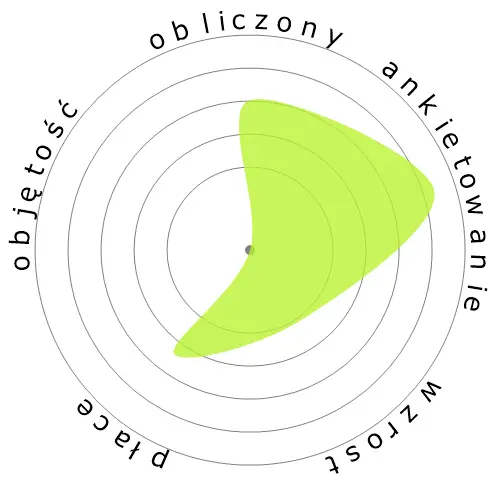Historycy




Ludzie również oglądali
Obliczone ryzyko automatyzacji
Niskie ryzyko (21-40%): Zawody na tym poziomie mają ograniczone ryzyko automatyzacji, ponieważ wymagają połączenia umiejętności technicznych i skoncentrowanych na człowieku.
Więcej informacji na temat tego, czym jest ten wynik i jak jest obliczany, jest dostępne tutaj.
Ankieta użytkownika
Nasi goście zagłosowali, że jest małe prawdopodobieństwo, iż ten zawód zostanie zautomatyzowany. To ocena jest dodatkowo wspierana przez obliczony poziom ryzyka automatyzacji, który szacuje 35% szansę na automatyzację.
Jakie są Twoje zdanie na temat ryzyka automatyzacji?
Jakie jest prawdopodobieństwo, że Historycy zostanie zastąpione przez roboty lub sztuczną inteligencję w ciągu najbliższych 20 lat?
Nastroje
Poniższy wykres jest zamieszczany wszędzie tam, gdzie istnieje znaczna liczba głosów, aby przedstawić istotne dane. Te wizualne reprezentacje pokazują wyniki ankiet użytkowników w czasie, dostarczając istotnych wskazówek dotyczących trendów nastrojów.
Nastroje w czasie (rocznie)
Wzrost
Liczba ofert pracy na stanowisku 'Historians' ma wzrosnąć 5,7% do 2033
Całkowite zatrudnienie oraz szacowane oferty pracy
Zaktualizowane prognozy mają być dostępne 09-2025.
Płace
W 2023, mediana rocznej pensji dla 'Historians' wynosiła 72 890 $, czyli 35 $ za godzinę.
'Historians' otrzymali wynagrodzenie wyższe o 51,7% od średniej krajowej, która wynosiła 48 060 $
Płace z biegiem czasu
Objętość
Od 2023 roku zatrudnionych było 3 040 osób na stanowisku 'Historians' w Stanach Zjednoczonych.
To oznacza około < 0,001% zatrudnionej siły roboczej w całym kraju.
Inaczej mówiąc, około 1 na 49 tysiąc osób jest zatrudnionych jako 'Historians'.
Opis stanowiska pracy
Badaj, analizuj, rejestruj i interpretuj przeszłość, jak została zapisana w źródłach, takich jak akta rządowe i instytucjonalne, gazety i inne periodyki, fotografie, wywiady, filmy, media elektroniczne oraz niepublikowane rękopisy, takie jak osobiste dzienniki i listy.
SOC Code: 19-3093.00


Komentarze
AI Reasoning
AI language comprehension and understanding of nuance and the secondary meanings of texts, items, and pictures.
OCR text recognition
Serious digitisation efforts that are neither cost efficient, sustainable, or practical for archival sources.
AI will not be able to perform the archival research needed to create new, innovative histories. Therefore, historians will remain completely safe from AI takeover.
So it's not only the content knowledge of a subject matter but the ability to understand and attempt field work, including standing up research based work, discovering, and even other stuff that all includes these types abilities.
Zostaw odpowiedź na temat tego zawodu